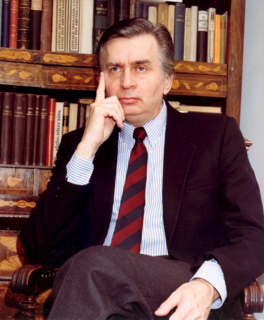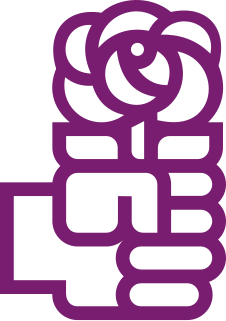
The Social Democratic Party of Albania is a social-democratic minor political party in Albania. The party held seats in Parliament between 1992 and 1996, and again from 1997 until 2009. It is currently led by Skënder Gjinushi, a former Minister of Education (1987–1991) and Speaker of Parliament.

The Republican Party of Albania is a national-conservative political party in Albania. It currently holds no seats in the Parliament of Albania.
The Unity for Human Rights Party is a social-liberal political party in Albania supporting the Greek minority. Founded in 1992, it represents Albania's minorities and is mainly related to the Greek minority, and is the political continuation of Omonoia. It works with Omonoia, MEGA and other Greek parties in Albania at national elections, under a Greek bloc. The party is currently led by Vangjel Dule, who held the party's only seat in Parliament until 2017.
Parliamentary elections were held in Albania on 3 July 2005. The result was a victory for the opposition Democratic Party (PD) and its allies, prominently the Republican Party (PR). Former president Sali Berisha became prime minister as a result of the election. Voter turnout was only 48.0%.

Federal elections were held in Germany on 12 January 1912. Although the Social Democratic Party (SPD) had received the most votes in every election since 1890, they had never won the most seats, and in the 1907 elections they had won fewer than half the seats of the Centre Party despite receiving over a million more votes. However, this election saw the party win more than double the number of votes of the second-placed Centre Party and become the largest party, winning 110 of the 397 seats.

Parliamentary elections were held in Macedonia on 18 October 1998, with a second round on 1 November. VMRO-DPMNE emerged as the largest party, winning 49 of the 120 seats, and later formed a coalition government with Democratic Alternative and the Democratic Party of Albanians.

Parliamentary elections were held in Hungary on 9 April 2006, with a second round of voting in 110 of the 176 single-member constituencies on 23 April. The Hungarian Socialist Party emerged as the largest party in the National Assembly with 186 of the 386 seats, and continued the coalition government with the Alliance of Free Democrats. It marked the first time a government had been re-elected since the end of Communist rule.
Parliamentary elections were held in Montenegro on 20 October 2002. The result was a victory for the For a European Montenegro alliance formed by the Democratic Party of Socialists of Montenegro and the Social Democratic Party of Montenegro, which won 39 of the 75 seats. It was the last parliamentary election held in Montenegro prior to independence in 2006.

Parliamentary elections were held in Hungary on 10 May 1998, with a second round of voting in 175 of the 176 single member constituencies on 24 May.

Constitutional Assembly elections were held in the newly independent Republic of Montenegro on 10 September 2006. Prime Minister Milo Đukanović's Coalition for a European Montenegro, at whose core was the Democratic Party of Socialists, won 39 seats in the 81 seat parliament with the vote near fully counted. The opposition blocs together received 34 seats. There were 484,430 eligible voters.
General elections were held in Luxembourg on 26 May 1974. The Christian Social People's Party remained the largest party, winning 18 of the 59 seats in the Chamber of Deputies. However, it went into opposition as the Luxembourg Socialist Workers' Party and Democratic Party formed a coalition government under prime minister Gaston Thorn.
General elections were held in Montenegro on 20 December 1992, with a second round of the presidential election on 10 January 1993. The elections were seen as a referendum on independence for Montenegro, and were won by the Democratic Party of Socialists of Montenegro who favoured greater autonomy within Yugoslavia. The presidential elections were won by Momir Bulatović, who received 63.4% of the vote in the second round. The result of the parliamentary elections was a victory for the Democratic Party of Socialists of Montenegro (DPS) who succeed ruling League of Communists of Montenegro. DPS won 46 of the 85 seats.
Parliamentary elections were held in Montenegro on 31 May 1998. The result was a victory for the So that we live better coalition formed by the Democratic Party of Socialists of Montenegro, Social Democratic Party of Montenegro and the People's Party of Montenegro which won 42 of the 78 seats.

The 1990 Hungarian parliamentary elections were held in Hungary on 25 March 1990, with a second round of voting taking place in all but five single member constituencies on 8 April. They were the first completely free and competitive elections to be held in the country since 1945, and only the second free elections in the country's history. The conservative, nationalist Hungarian Democratic Forum (MDF) beat the liberal and more internationalist Alliance of Free Democrats, which had spearheaded opposition to Communist rule in 1989, to become the largest party in parliament. The Hungarian Socialist Party, the former Communist party, suffered a crushing defeat, winning only 33 seats for fourth place.

Parliamentary elections were held in Hungary on 8 May 1994, with a second round of voting in 174 of the 176 single member constituencies on 29 May. They resulted in the return to power of the Hungarian Socialist Party, the former Communist party, under the leadership of Gyula Horn, who became Prime Minister. The Socialists achieved a remarkable revival, winning an overall majority of 209 seats out of 386, up from 33 in 1990. At the time, it was the most seats that a Hungarian party had ever won in a free election.

General elections were held in Yugoslavia on 24 September 2000. In the presidential election, official results initially showed Vojislav Koštunica of the Democratic Opposition led incumbent Slobodan Milošević of the Socialist Party of Serbia in the first round of voting, but short of the 50.01 percent needed to avoid a runoff election. However, Koštunica claimed he was not only ahead, but had finished just a few thousand votes over the threshold to win a first-round victory. Spontaneous protests broke out in support of Koštunica, and Milošević was forced to resign on 7 October and concede the presidency to Koštunica. Revised totals were subsequently released showing Koštunica had indeed won a narrow first-round victory, with just over 50.2 percent of the vote.
Parliamentary elections were held in Albania on 24 June 2001. The result was a victory for the ruling Socialist Party of Albania, which won 73 of the 140 seats, resulting in Ilir Meta remaining Prime Minister. Voter turnout was 53.6%.
Early parliamentary elections were held in Albania on 29 June 1997 alongside a simultaneous referendum on restoring the monarchy, with a second round of voting for 32 seats on 6 July. The elections were called as a response to the 1997 Pyramid Crisis. The result was an overwhelming victory for the opposition Socialist Party of Albania, which won 101 of the 151 seats. Voter turnout was 72.6%.
Parliamentary elections were held in Albania on 22 March 1992, with a second round of voting for eleven seats on 29 March. The result was a victory for the opposition Democratic Party of Albania, which won 92 of the 140 seats. After the election Aleksandër Meksi became Prime Minister and Sali Berisha became President.

General elections were held in Macedonia on 16 October 1994 to elect a President and Assembly, with a second round of Assembly elections on 30 October. The presidential election was won by Kiro Gligorov of the Alliance for Macedonia, whilst the parties forming Alliance for Macedonia also won the Assembly elections with 95 of the 120 seats. However, the second round of the Assembly elections were boycotted by VMRO-DPMNE and the Democratic Party, as they claimed there had been irregularities in the first round.















